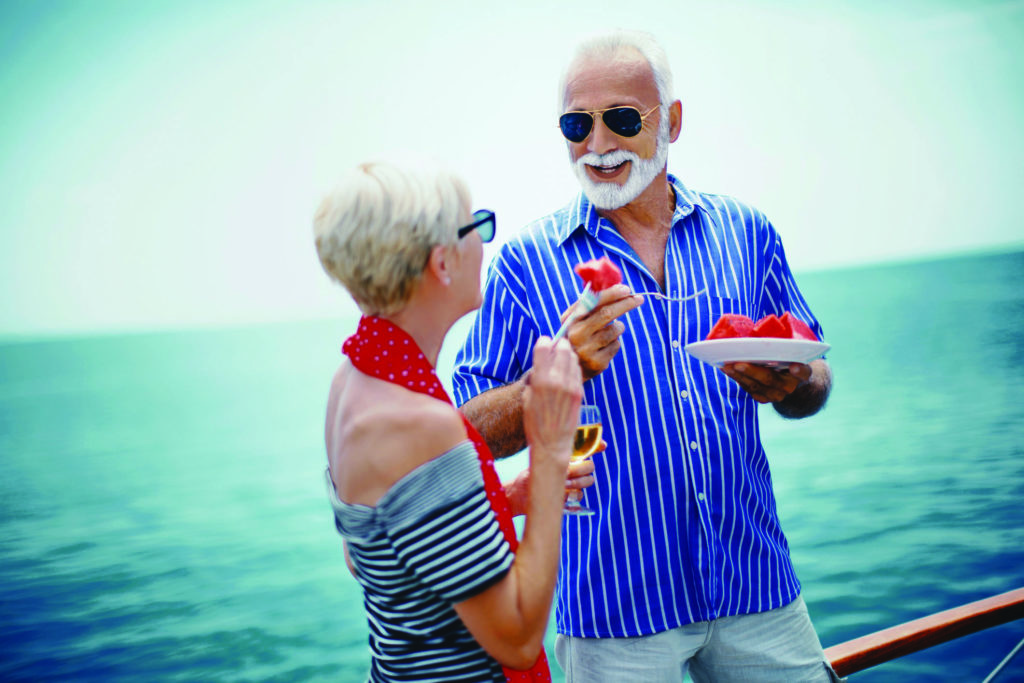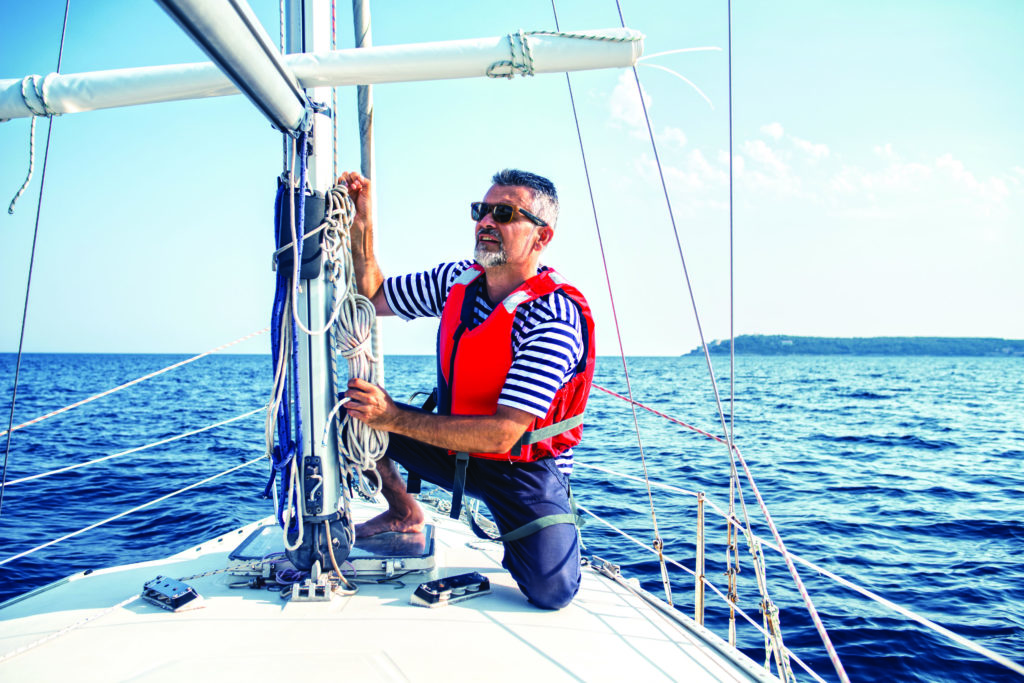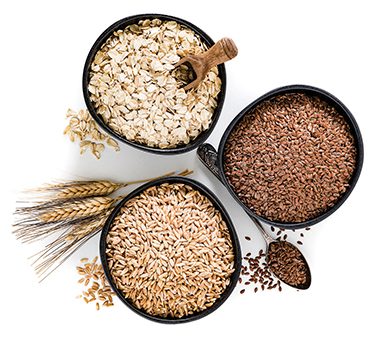dIetarY Considerations for Boaters

Leisurely cruising on powerboats may involve very little physical exertion, whereas boating in nonmotorized vessels such as canoes, kayaks or sailboats may involve strenuous exercise. Along with requiring varying amounts of physical activity, boat trips may last hours, days, weeks or even longer, so nutritional demands will vary depending on the type of boating excursion.
Boating also often affects eating patterns, which may have short- or long-term nutritional health consequences. Since many boats have limited storage for perishable food and may or may not accommodate cooking, boaters often opt for preserved or concentrated foods instead of fresh foods. This selection may present no issues in short-term situations, but on longer trips this could be problematic.
The National Marine Manufacturers Association reported that in 2011 about 83 million people, or nearly one-third of the adult population of the United States, participated in recreational boating. About 15 percent sailed, 15 percent paddled in kayaks or canoes, and about 60 percent used powerboats, 96 percent of which were 26 feet or shorter. Most vessels are suitable for nearshore day trips rather than long-term cruises covering significant distances. For day-trip boaters on small vessels, the primary dietary concern is food safety, while boaters cruising for longer periods need to also be concerned about the nutritional value of their food.
Ensuring sufficient intake of vitamins and minerals, maintaining proper biota and regularity, and preventing or managing some ailments that result from a change in nutrition and lifestyle are the main nutritional concerns for boaters on long excursions.
Caloric Intake
The average sedentary adult requires between 1800 kilocalories (kcal) and 2000 kcal for women and between 2000 kcal and 2200 kcal for men. Adults who lead more active lifestyles with exercise levels that amount to walking more than 4.8 kilmometers (3 miles) per day at an intensity of 4.8 to 6.4 kilometers per hour (3 to 4 miles per hour) — in addition to the activities of independent living — need another 500 kcal to 600 kcal per day.
Competitive sailing is considered a high-intensity activity, and daily energy expenditures may range from 3500 kcal to 5800 kcal. Kayaking and canoeing are usually classified as moderate physical activities with energy consumptions of 3.5 kcal to 7 kcal per minute or 200 kcal to 420 kcal per hour, so prolonged paddling may burn a significant number of calories. Elite sailors and kayakers with higher energy needs may have to resort to high-energy foods to meet their daily recommended caloric intake.
Most people aboard powerboats, however, will expend less energy cruising than they usually do in their daily lives unless they actively pursue exercise opportunities. Boaters cruising for weeks at time may be at risk of gaining weight if they do not adapt their caloric intake to the change in their activity level due to the prevalence of preserved and highly caloric food on boats.
Healthy Eating
The U.S. Food and Drug Administration (FDA) recommends a diet that incorporates foods from all main food groups (vegetables, fruits, grains, dairy and protein) and a variety of subgroups for adequate daily caloric intake and to maintain a proper balance of vitamins and minerals.
Vegetables are important sources of vitamins, minerals and fiber. Dark-green vegetables are rich in vitamin K, red and orange vegetables contain vitamin A, legumes offer dietary fiber, and starchy vegetables contain potassium. The recommended serving is 2½ cups of fresh, frozen, canned or dried vegetables daily, either cooked, raw or juiced. Eating a variety of vegetables is the best strategy for obtaining all necessary nutrition. Day boaters and cruisers in intracoastal waters can easily carry fresh vegetables. For longer cruises where fresh vegetables are scarce, boaters should consider a variety of preserved vegetables. Canned legumes are already a common choice for many people at home, and boaters should consider bringing canned leafy greens such as spinach, collard greens, mustard greens and turnip greens, which are very nutritious. In some countries where refrigeration is less common, there is a wide variety of canned vegetables.
An important source of dietary fiber, potassium and vitamin C, fruits can be consumed fresh, canned, frozen, dried or as juice. The recommended serving of fruit is 2 cups per day. Whole fruit is preferred to juice because it contains dietary fiber, while juice is generally very high in sugar. Fruit is available in most parts of the world, and many types of fruits keep well if not previously frozen. Canned fruit may be a better option for long trips, but most canned fruit has added sugar, so choose one with as little sugar as possible. Dried fruit is especially suitable for boat pantries because it provides twice as many nutrients as the same amount of fresh fruit.
Grains are either whole or refined. Nutrients including dietary fiber, iron, zinc, manganese, folate, magnesium, copper, thiamin, niacin, vitamin B6, phosphorus, selenium, riboflavin and vitamin A come from the bran and germ of whole grains. The recommended serving of grains for people with basic activity levels is 6 ounces per day, and at least half of this amount should be whole grains. Diets should include brown rice, oatmeal, quinoa, whole wheat or whole grain breads, cereals, pasta and crackers. If you prefer refined grains and wheat products such as white bread or cereal, use vitamin- and mineral-enriched products fortified with folic acid. Many products such as cookies, cakes and some snacks contain added sugars that may unnecessarily increase your calorie intake.

Competitive sailing is considered a high-intensity activity, and daily energy expenditures may range from 3500 kcal to 5800 kcal.

Dried fruit is especially suitable for boat pantries because it provides twice as many nutrients as the same amount of fresh fruit.

The recommended serving of grains for people with basic activity levels is 6 ounces per day, and at least half of this amount should be whole grains.
DAN Customer Service
Mon–Fri, 8:30 a.m. – 5 p.m. ET
+1 (919) 684-2948
+1 (800) 446-2671
Fax: +1 (919) 490-6630
24/7 Emergency Hotline
In event of a dive accident or injury, call local EMS first, then call DAN.
24/7 Emergency Hotline:
+1 (919) 684-9111
(Collect calls accepted)
DAN must arrange transportation for covered emergency medical evacuation fees to be paid.
Medical Information Line
Get answers to your nonemergency health and diving questions.
Mon–Fri, 8:30 a.m. – 5 p.m. ET
+1 (919) 684-2948, Option 4
Online: Ask A Medic
(Allow 24-48 hours for a response.)